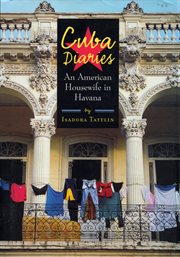Details
PUBLISHED
Made available through hoopla
DESCRIPTION
1 online resource
ISBN/ISSN
LANGUAGE
NOTES
Isadora Tattlin is the American wife of a European energy consultant posted to Havana in the 1990s. Wisely, the witty Mrs. Tattlin began a diary the day her husband informed her of their new assignment. One of the first entries is her shopping list of things to take, including six gallons of shampoo. For although the Tattlins were provided with a wonderful, big house in Havana, complete with a staff of seven, there wasn't much else money could buy in a country whose shelves are nearly bare. The record of her daily life in Cuba raising her two small children, entertaining her husband's clients (among them Fidel Castro and his ministers and minions), and contending with chronic shortages of, well . . . everything (on the street, tourists are hounded not for money but for soap), is literally stunning. Adventurous and intuitive, Tattlin squeezed every drop of juice--both tasty and repellent--from her experience. She traveled wherever she could (it's not easy--there are few road signs or appealing places to stay or eat). She befriended artists, attended concerts and plays. She gave dozens of parties, attended dozens more. Cuba Diaries--vividly explicit, empathetic, often hilarious--takes the reader deep inside this island country only ninety miles from the U.S., where the average doctor's salary is eleven dollars a month. The reader comes away appalled by the deprivation and drawn by the romance of a weirdly nostalgic Cuba frozen in the 1950s. Isadora Tattlin was born and raised in California and spent her early adulthood in New York City. She is married to a European executive and lives now wherever his job takes them and their two young children. Call me Isadora. Nick says, "What about Cuba?" "What do you mean, 'What about Cuba?'" "What about being there for a few years? L. proposed it." L. is Nick's boss. "Are you kidding me?" "What do you think?" I cannot speak. I am thinking about how I have said to Nick sometimes that it would be nice to be a little closer to the United States on Nick's next assignment. It was as if some overly zealous fairy godmother had heard me. Either that, or I had not specified enough when I made my wish. You have to be careful with those wishes, for they can come true. "Cuba?" "How about it?" "I . . . I just don't know. When do we have to get back to them?" "This afternoon." One hour later, I'm in the station wagon, going to pick my six-year-old up from school, and suddenly I'm not there anymore but under my desk during bomb drill, staring at the red rubber soles of Jonathan Muller's Buster Browns. It's California, 1962. Something about the Cubans, the Russians, and nuclear missiles pointed directly at Saint Stephen's School. People with beards are very dangerous. Also, panic buying in the supermarket. Cans of chicken noodle soup smashed, lying on the floor. Soon after that, it is determined that the fifth grade should stop learning French and start learning Spanish. A big Cuban boy appears at school. Carlos. But he is the nice kind, we are told, not the mean kind, who want to bomb us. He does not know any English but quickly learns to say, "Shadap." His mother comes, too, to teach us Spanish. She has long black leg hairs smushed under her stockings and a mole hidden in the fold of her double chin, which pops out when she looks up at the clock, so that we can hardly get past the "Yo soy, tu eres," so much are we waiting for that mole. The other teachers cannot speak about her among themselves without making violiny sounds with their voices. She had to hide her wedding ring in her shoe to get out of Cuba. I picture people leaving Cuba with little circles printed on the soles of their feet, tiny holes gouged by diamonds. Cuba. Now I find myself breathing fast, and I have a racing feeling up and down my arms, which is what happens whenever I have to
Mode of access: World Wide Web







